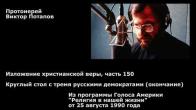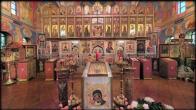ABOUT ORTHODOXY
You are here
The Parables of the Friend Who Asks for Bread and of the Unjust Judge
If in the preceding two parables - of the builder of the tower and of the king preparing for war - the Lord impressed on us the necessity of appraising our strength and the inevitability of struggling with difficulties and temptations, then in the next two parables - of the friend who asks for bread and of the unjust judge - Christ strengthens our faith in the fact that God hears and fulfills the requests of those who hope in Him. There is a close connection between both parables. Therefore, we shall speak of them together. We find both parables in the Gospel according to Luke. The first is the parable of the friend who asks for bread:
And he said unto them, Which of you shall have a friend, and shall go unto him at midnight, and say unto him, Friend, lend me three loaves; for a friend of mine in his journey is come to me, and I have nothing to set before him? And he from within shall answer and say, Trouble me not: the door is now shut, and my children are with me in bed; I cannot rise and give thee. I say unto you, Though he will not rise and give him, because he is his friend, yet because of his importunity he will rise and give him as many as he needeth (Luke 11:5-8).
The second parable - of the unjust judge - we also find in the Gospel according to Luke:
There was in a city a judge, which feared not God, neither regarded man: and there was a widow in that city; and she came unto him, saying, Avenge me of mine adversary. And he would not for a while: but afterward he said within himself, Though I fear not God, nor regard man; yet because this widow troubleth me, I will avenge her, lest by her continual coming she weary me. And the Lord said, Hear what the unjust judge saith. And shall not God avenge his own elect, which cry day and night unto him, though he bear long with them? I tell you that he will avenge them speedily. Nevertheless when the Son of man cometh, shall he find faith on the earth? (Luke 18:2-8).
The parable of the friend who asks for bread provides a vivid picture of life in a Palestinian village. Apparently, there are no stores in it. At daybreak, the housewife bakes the family's supply of bread for the whole day. Towards evening, the inhabitants of the village usually knew whose supply of bread had not yet run out. In the East, it was considered as a duty to receive and feed unexpected strangers. The one in the parable who asks for bread from his friend intended to repay the borrowed bread before long.
Towards evening it is dark in the house, and in the village they usually go to bed early. The wick of the oil filled lamp burns dimly all night. The door is now shut, and my children are with me in bed; I cannot rise and give thee. The doors are held shut by a large bolt. It is complicated to open the doors, and furthermore, any movement of the bolt will cause a loud noise and will wake up the household. The fact that the man's children are with him in bed indicates the entirely small size of the peasant's house, which probably consisted in all of only one large room. Under such circumstances, to get up in order to do a service to the one asking for bread would mean causing the family certain inconveniences. One ought not understand the man's words, I cannot rise and give thee, as a refusal, but rather as an attempt to emphasize the difficult position in which his neighbor had put him. Christ is sure that the friend will give the bread, in spite of the late hour and the other difficulties with which the master of the house is faced. Christ is asking His listeners, as it were, to put themselves in the place of the man who, according to the traditions of hospitality in the East, was obliged to render help to a friend at any time of day or night. Not only did tradition dictate this, but also the desire to get free sooner in order to return to one's previous pursuit, in this case, to sleep.
One can say the same about the second parable - of the unjust judge. The judge nevertheless decided to defend the widow so that she would stop pestering him. Even more will the Lord God hearken unto us and help us.
Both parables indicate to us the necessity for constancy in prayer in order to receive what is asked for. Sometimes God does not immediately fulfill our prayer, even if what was asked for was both necessary and in accordance with God's will, and even if the prayer was offered with faith and hope. In His divine wisdom and omniscience, the Lord fulfills our prayers in accordance with His Providence, sometimes testing our faith and always knowing what is better for us and when. We must believe that God will fulfill our request in His time and in the form most beneficial for us.
The Holy Fathers also teach us constancy and steadfastness in prayer. "Ask for what is worthy of God," says Saint Basil the Great, "not ceasing to ask until thou receivest. Though a month passes or a year or three years or a greater number of years until thou receivest, do not give up, but ask with faith, constantly doing good."
Judging by the fact that the parable of the unjust judge was spoken, as the Evangelist Luke relates, after the discourse on the Second Coming of Christ, the Lord indicated in the parable that even in the especially difficult time for Christians before His Second Coming, one must unwaveringly remain in a prayerful disposition of spirit and not become despondent, for the Lord defends those faithful to Him. The expression, though he bear long with them who cry unto Him day and night, that is, who intensely and insistently pray to Him - confirms that which was already said by us, namely, that God fulfills prayers in accordance with His plans and the purposes known to Him alone, at the time established by Him; however, a sincere prayer that is not contrary to God's will, never remains unheard.
Christ illustrates this truth in direct speech immediately after the parable of the friend who asks for bread, by indicating the mode of successful prayer: Ask, and it shall be given you; seek, and ye shall find; knock, and it shall be opened unto you. For every one that asketh receiveth; and he that seeketh findeth; and to him that knocketh it shall be opened (Luke 11:9-10). "And so, O man, do not become despondent," says Saint John Chrysostom; "ask, knock at the doors of God's loving-kindness, and even if thou receivest not at once, then in that case also do not despair. For this is why Christ also said: Knock, in order to show that even if He does not quickly open the doors, all the same one must wait." And again from Chrysostom: "…one must ask, because God does not give good things to those who do not want to ask them of Him, who close their heart and are, therefore, incapable of receiving His grace."
In the example of the father who does not give his son what is harmful to him when he asks for what is beneficial (Luke 11:11-13), Christ again reveals the truth that the all good Lord grants a man everything needful to him, and only what is needful and beneficial for him. The meaning of this teaching is clear: If men who are entirely imperfect in love are able to give good gifts to their children, then all the more will our Heavenly Father give good things (Matthew 7:11) to them that ask of Him. And we, the Holy Fathers teach, sometimes ask a stone of God instead of bread, that is, we ask what is not beneficial for us.
Let us trust in God's will, for God knows better than we when to fulfill our prayer requests. Let us manifest constancy and patience in our prayer life.
The Canaanite woman, in the Gospel narrative of the healing of her daughter by Christ, is an example of astonishing constancy and persistence in prayer. She would not leave the Saviour, no matter what. Let us recall this Gospel account:
…a woman of Canaan…cried unto him, saying, Have mercy on me, O Lord, thou son of David; my daughter is grievously vexed with a devil. But he answered her not a word. And his disciples came and besought him, saying, Send her away; for she crieth after us (Matthew 15:22-23). The Lord was silent… But His silence was necessary as the beginning of that significant and cosmic event that was to take place presently. The disciples, somewhat vexed by the persistence of the woman who, despite the Lord's silence, did not cease making her requests, ask Christ to send her away, not understanding the Saviour's silence. And in reply to their utterances, the Lord's response resounds, intensifying even more this scene which at first glance was so harsh.
I am not sent but unto the lost sheep of the house of Israel (Matthew 15:24), says the Lord. In spite of this negative answer from Christ, the Canaanite woman approaches Him and says: Lord, help me. But he answered and said, It is not meet to take the children's bread, and cast it to dogs (Matthew 15:25-26). This reply might seem sharp and even cruel to us. It would seem that after such a reply the woman of Canaan should have drawn away from Jesus, offended by His words. And not only drawn away, but even become embittered against Him Who had compared her and her people to dogs. But this did not happen. Her answer sounds completely different.
And she said, Truth, Lord: yet the dogs eat of the crumbs which fall from their masters' table (Matthew 15:27). And the sounds of her words had not yet died away as the following words of the Lord were heard, which revealed the eternal meaning of this Gospel episode: Then Jesus answered and said unto her, O woman, great is thy faith: be it unto thee even as thou wilt. And her daughter was made whole from that very hour (Matthew 15:28).
In His encounter with the Canaanite woman, Christ wanted to show to the whole world the example of this woman's faith, humility and persistence. Let us too, beloved, follow this example.
©V. Potapov
PARISH LIFE
RECENT VIDEOS
Address of our Cathedral
Subscribe to our mailing list
While all the materials on this site are copyrighted, you may use them freely as long as you treat them
with respect and provide attribution on the Russian Orthodox Cathedral of St.John the Baptist of Washington DC.









